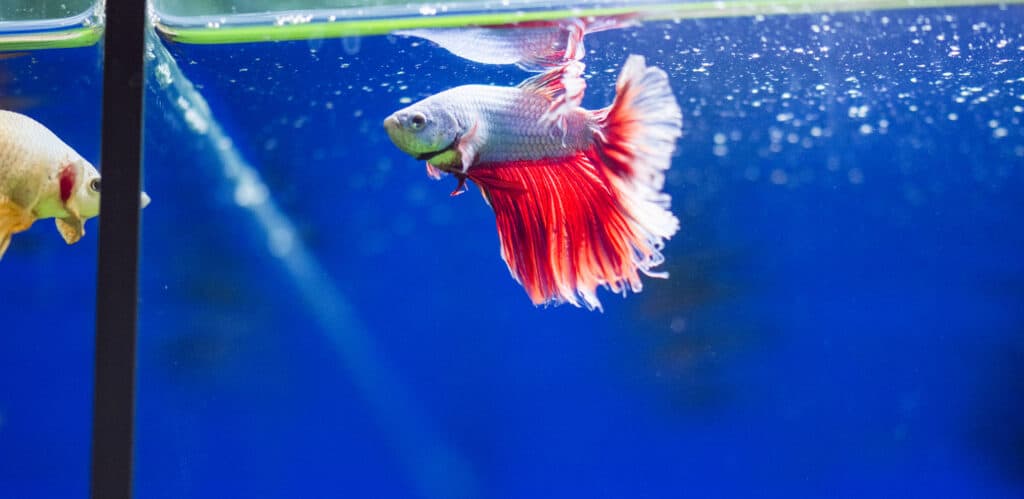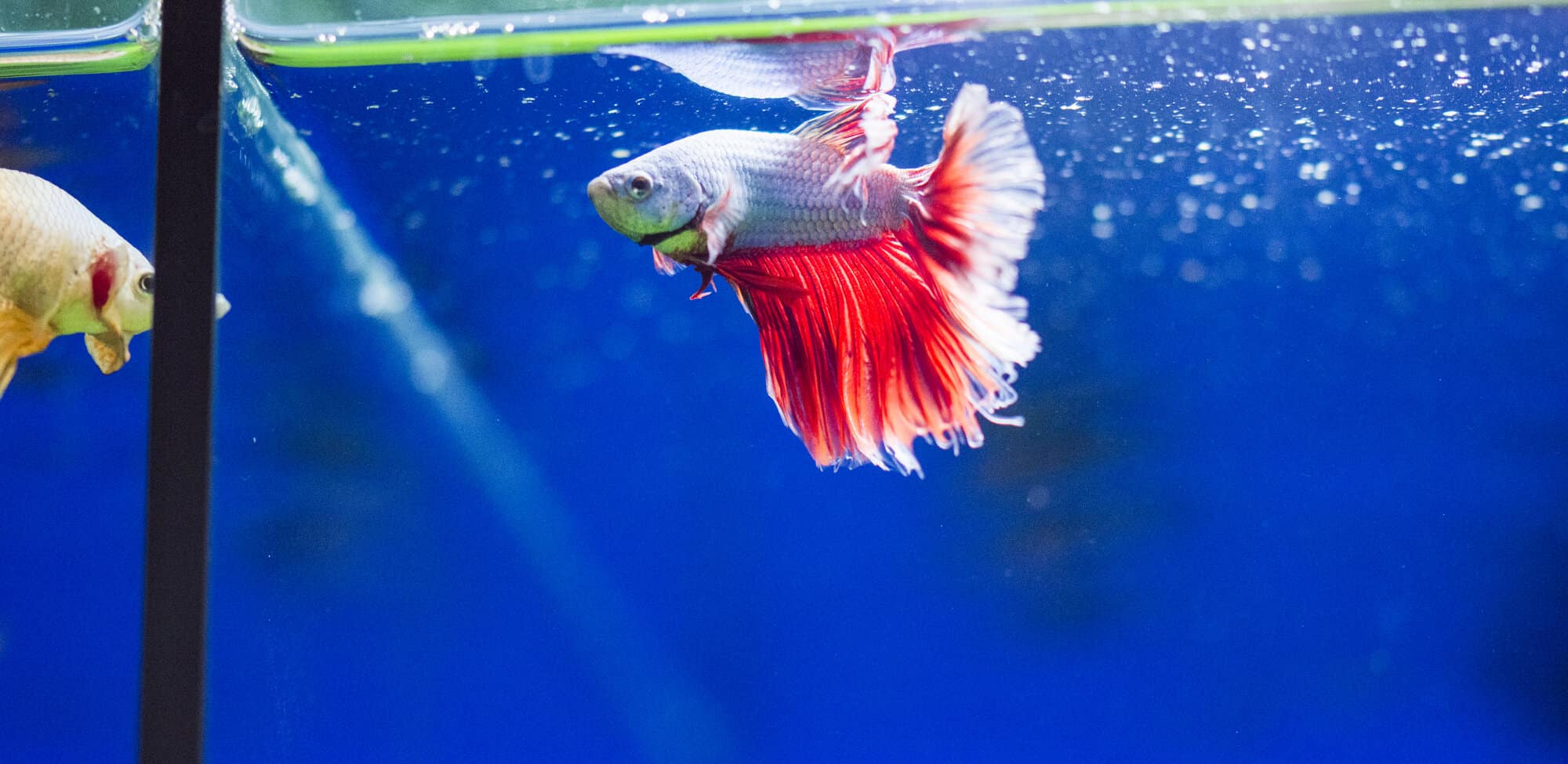Betta fish are popular, striking aquarium fish. Like any pet, your betta fish needs proper nutrition to grow and thrive.
If you don’t have betta food, you may be wondering, “can I feed my betta fish human food”?
Read on to find out!
Are There Any Human Foods Your Betta Fish Can Eat?
It turns out that betta fish can eat some human food, but not all. The human foods they can eat depends on how much and how often you give to them.
Betta fish prefer variety in their diet, and a regular diet, like what they would eat in their natural habitat, will allow them to thrive.
When feeding bettas human foods, it’s important to choose foods that have none or very little amounts of additives and fillers.
They also shouldn’t be fed human food regularly. It should be treated as a last resort if you run out of their usual foods.
Here is some human food that your pet fish can eat.
Human Foods Safe for Your Betta Fish
- Peas: Peas are a great source of fiber that bettas occasionally enjoy. They can help with bloating and constipation in fish also. The key to feeding peas to your betta is to ensure that they are cut into extremely small pieces and have a mushy consistency. You’ll also need to remove the outer skin of the pea.
- Leafy Vegetables: Leafy greens like cucumbers, lettuce, and spinach are enjoyable for bettas. To use this food, slice the greens into small pieces and boil the cucumber until it is softened.
- Sweet corn: When feeding this type of food to your betta, it’s best to feed just one kernel that is boiled. Remove the outer skin like the peas for easier eating.
- Mango: When feeding this sweet fruit to your betta, it is important to remove it from the tank if it isn’t eaten within 30 minutes. It can become fatal if left in the aquarium for too long. A tiny piece of mango should be an occasional treat.
- Tuna or Shrimp: Raw shrimp and tuna are good for your betta as long as they are unseasoned without any oil. If you want to use canned tuna as food for betta fish, get those that are packed with freshwater or brine and not the ones with any oil.
- Rice: Most aquarium fish love to eat rice, and bettas are no exception. When giving rice to your betta, you need to boil it until it is mushy and soft. Only give a few grains of rice as an occasional treat, and ensure that it isn’t seasoned or cooked in oil.
Any uneaten human food you feed your betta needs to be removed from the tank in half an hour to prevent bacteria in the aquarium water.
Human Foods Harmful to Your Betta Fish
Here are a few foods that aren’t safe for your betta:
- Bread: Unlike humans, bread doesn’t hold any nutritional benefit for your betta. Bettas are carnivores, so carbohydrates do not provide them with adequate nutrition.
- Plants: As previously stated, bettas are carnivores, so they will not eat plants. They need a balanced diet of balanced protein to allow them to be healthy.
- Fiber Rich Stringy Vegetables and Fruits: Foods like bananas, beans, and carrots are very difficult for your betta to chew and digest and can lead to bloating and other digestive problems. It’s also good to avoid vegetables with bitter tastes like broccoli, onions, shallots, cabbage, or Brussels sprouts.
- Citrus fruits: Citrus fruits are very dangerous for your fish tank. They can lower the PH of the water and make it acidic, which can cause your fish to become ill.
- Meat: Giving meat from farm animals like cows, chickens, or pork to your betta fish is not good for their health. It can cause severe digestive problems if they eat it. Bacon also isn’t safe for your betta because of its additives.
A Betta Fish’s Natural Diet
Betta fish need lots of protein in their diet to thrive. They eat shrimp, fish, bloodworms, and other small animals in the wild.
To keep your betta fish healthy at home, you need to re-create the diet they eat in the wild.
Foods your betta fish can eat regularly include:
- Worms: Glass worms, blood worms, white worms
- Daphnia
- Mosquito larvae
- Brine Shrimp
- Copepods
If you plan to feed your betta freeze-dried varieties of these foods, soak them in water to prevent digestion problems.
You can occasionally give your fish betta pellets, but reduce the amount to prevent digestive issues. If you give pellets, soak them in water first to make them easier for your fish to eat.
The Betta Fish Digestive System
Just like humans, bettas have a digestive system. We will explain the parts of the system so you can understand how it works.
Mouth
Betta fish are surface feeders with an upturned mouth. This is why commercial betta foods are made to float and not sink.
Teeth
Did you know that betta fish have teeth? They use their teeth to help break down their food before swallowing it, just like humans.
Digestive Tract
Betta fish have a small stomach equal to the size of their eye. Their digestive tract is also very short. Overfeeding can lead to bloating and constipation and affect their swim bladder.
Bettas are especially gluttonous eaters and will eat anything you give them, so it’s important not to over-feed.
Feeding Tips for Healthy Betta Fish
To keep your betta fish healthy, it’s important to follow a few important tips:
Don’t Overfeed Your Betta
Give your betta 4-8 pieces of food twice a day. Bettas can’t regulate the amount of food they eat, so it’s important not to overfeed. Overfeeding can cause your fish to become ill.
Have a Feeding Schedule
Feeding your betta twice daily every 12 hours is a good schedule to keep them on. Keeping a 12-hour window is important to regulate your fish’s digestive system.
Provide 75% to 90% Meat-Based Foods
It is fine for bettas to eat fruits and vegetables occasionally, but because they are carnivores, they need a 75 to 90 percent meat-based diet.
Avoid Giving Human Food in Excess
Giving too much human food can harm your betta’s health, and they can’t survive on just human food. Human food can be given as the occasional treat, once or twice weekly.
Give Variety
Betta fish can be picky eaters and need a variety of foods to be happy and healthy. Frozen or freeze-dried foods are the best option, but raw and fresh foods can also be given to provide more variety for your betta.
Feed Daily
To ensure your betta fish is getting enough protein, they must be fed daily. An excellent source of protein is a crucial part of your betta’s diet.
Other Betta Food Alternatives
So you’re out of betta food and can’t make it to the store, and you don’t have any of the foods we already mentioned. Here are some more betta food alternatives.
Hard-Boiled Egg Yolks
Egg yolks are an excellent source of proteins and a natural fish food substitute. Before serving the egg yolk, it will need to be hard-boiled to ensure it’s easy for them to eat.
Egg yolk can cloud your water if you give too much, so give small amounts. For more information on how to make egg yolks for your fish watch this video.
Beef Heart
Beef heart can be made at home with just a few simple ingredients. Here is a great recipe for the homemade beef heart.
What You’ll Need
- 1 beef heart
- 1 10-ounce bag of frozen spinach
- 6 crushed and liquified multi-vitamins
- 6 cloves fresh garlic
- 3 handfuls fish flakes (any kind)
- 6 ounces Red AZOO pellets
- 1 ounce paprika
How To Make It
- Remove all veins and fat from the heart and mix in a food processor until it is almost fully ground, then mix in the other ingredients until it forms a paste.
- Store in quart Ziploc bags, flatten and freeze.
- When feeding this to bettas, break it into small pieces and microwave until partially thawed and feed.
Homemade Betta Food
A simple paste can be made at home for a meal during the days when you just can’t get to the store.
This can be made from a small portion of chicken liver and garlic juice or garlic. Blend the two together to form a paste.
The easiest way to feed this to your betta is to put some into a syringe and place a small amount at the top of your tank.
It’s important to collect leftovers to prevent ammonia spikes in your tank. Chicken liver can give your betta healthy proteins without the fat, and garlic helps to improve their immune system.
Conclusion
If you run out of food and can’t make it to the store, don’t worry. There are plenty of foods you can feed your betta to sustain them until then.
Human foods like egg yolks, leafy vegetables, rice, and more can be fed to your betta in small amounts to tide them over. Be sure not to over-feed them, and you’ll have a healthy and happy betta.

